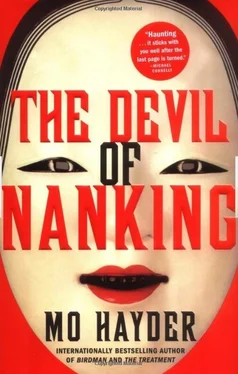‘You haven’t got a hotel?’
‘No.’
‘You just arrived?’
‘Yes.’
He laughed. ‘There’s a room at my place. There’s just about a hundred rooms at my place.’
‘At your place?’
‘Sure. My house. You can rent a room there.’
‘I haven’t got any money.’
‘Well, hell-oh! We’re in Tokyo. Don’t listen to the economists, there’s still truckloads of money to be had here. You just open your eyes. There are still hostess clubs on every corner.’
The girls at university used to fantasize about working in the Tokyo hostess clubs. They’d go on and on about how much they’d earn, the gifts they’d be showered with. I used to sit in the corner in silence, thinking it must be lovely to be that confident.
‘I wait tables in one,’ he said. ‘I’ll introduce you to the mama-san, if you want.’
The colour rushed to my face. He couldn’t imagine how it made me feel to imagine working in a hostess club. I turned away and finished tying my shoes. I got to my feet and brushed my clothes down.
‘Serious. It’s awesome money. The recession hasn’t hit the clubs yet. And she likes weirdos, Mama-san.’
I didn’t answer. I zipped up my cardigan, heaved the holdall over my head so the strap lay diagonally across my chest. ‘Sorry,’ I said clumsily. ‘Got to go.’ I folded my arms and headed away from Jason, across the park. A breeze came through and rattled all the children’s windmills. Above me the sun glinted on the skyscrapers.
He caught up with me at the park exit. ‘Hey,’ he said. I didn’t stop so he walked sideways next to me, grinning. ‘Hey, weirdo. Here’s my address.’ He shoved out his hand and I stopped to look at it. He was holding a scrap of a cigarette carton with an address and phone number scrawled on it in biro. ‘Go on, take it. You’d be funny in our house.’
I gazed at it.
‘Go on.’
I hesitated, then grabbed the piece of cardboard, crunched my hand back up into my armpit, put my head forward and went on my way. Behind me I heard him laugh and cheer. ‘You’re awesome, weirdo. I like you.’
That morning, when the Bambi café waitress brought my iced coffee and Danish, she also put down on the table a huge plate of rice, some balls of fried fish, two small dishes of pickled vegetables and a bowl of miso soup.
‘No,’ I said in Japanese. ‘No. I didn’t order this.’
She glanced over to where the manager was checking receipts at the cash desk, then turned to me, rolled her eyes to the ceiling and put her finger to her lips. Later, when she brought me the chit I saw she’d charged me only for the Danish. I sat for a while, not knowing what to say, staring at her as she went round the other tables, pulling her notepad out of her pie-crust apron pocket, scratching her head with a pink Maruko Chan pen. You just don’t get that sort of generosity every day, at least not as far as I know. I suddenly wondered who her father was. Her grandfather. I wondered if he’d ever talked to her about what happened in Nanking. For long years the schools hadn’t taught about the massacre. All mention of the war was whited out of textbooks. Most Japanese adults had only the vaguest idea of what had happened in China in 1937. I wondered if the waitress even knew the name Nanking.
You have to study something for a long time before you understand it. Nine years, seven months and nineteen days. And even that, it turns out, isn’t long enough for some things. Even after everything I’ve read about the years when Japan invaded China, I still don’t really know why the massacre happened. The experts – the sociologists and the psychologists and the historians – they all seem to understand. They say it was about fear. They say that the Japanese soldiers were afraid and tired and hungry, they’d fought tooth and nail for Shanghai, beaten off cholera and dysentery, marched across half of China, and were close to breaking-point when they got to the capital. Some of them say that the Japanese soldiers were just products of a power-hungry society, that they’d been brainwashed into seeing the Chinese as a lesser species. Some say that an army like that, walking into Nanking and finding hundreds of thousands of defenceless citizens hiding in the bombed-out buildings… Well, some people say, maybe what happened next was hardly surprising.
It didn’t take the Imperial Japanese Army long. In only a few weeks they’d killed anything up to three hundred thousand civilians. When they had finished, so the stories go, you didn’t need boats to get from one side of the Yangtze river to the other. You could walk across the corpses. They were so inventive in the new ways they found to kill. They buried young men up to their necks in sand and drove tanks at their heads. They raped old women, children and animals. They beheaded and dismembered and tortured; they used babies for bayonet practice. You wouldn’t expect anyone who had lived through that holocaust to trust the Japanese again.
There had been a 16mm projector in Shi Chongming’s office. I’d been wondering about it all night. Whenever I started to think I’d imagined the reference in the journal I’d whisper to myself: ‘What does a professor of sociology need a film projector for?’
He arrived at the university just before ten o’clock. I saw him at a great distance, very tiny like a child, moving painfully along the pavement. His navy tunic was fastened in ties at one side in a very unJapanese way and he hobbled along on his cane, going at half the speed of the others, a black plastic fisherman’s hat crammed down over his long white hair. By the time he reached the red lacquered gate I was waiting, watching him coming down the street towards me.
‘Hello?’ I took a step forward and Shi Chongming stopped in his tracks.
He looked at me angrily. ‘Don’t talk to me,’ he muttered. ‘I don’t want to talk to you.’ He limped away in the direction of the Institute. I followed, walking shoulder to shoulder with him. It must have looked rather polite in a way, a dour little academic hobbling along, pretending there wasn’t a gangling foreign girl in strange clothes keeping pace with him. ‘I don’t like what you’re bringing.’
‘But you’ve got to talk to me. This is the most important thing in the world.’
‘No. You’ve got the wrong man.’
‘I haven’t. It’s you. Shi Chongming. What’s on that film is what I’ve been looking for for nearly ten years. Nine years, seven months and-’
‘And eighteen days. I know. I know. I know.’ He came to a halt and looked at me. The anger had brought out little orange flecks in his irises. He gazed at me for a long, long time, and I remember thinking vaguely that I must remind him of something because his expression was so intent and thoughtful. At length he sighed and shook his head. ‘Where are you staying?’
‘Here, in Tokyo. And it’s seven months and nineteen days now.’
‘Tell me, then, where to contact you. Maybe, in a week or two when I’m not so busy, maybe I can give you an interview about my time in Nanking.’
‘A week? Oh, no, I can’t wait a week. I haven’t got any-’
He made an impatient noise in his throat. ‘Tell me something,’ he said. ‘Tell me, do you know what some rich Beijingers will do to teach their sons English?’
‘I’m sorry?’
‘Do you know the lengths they will go to?’ He lifted his tongue and indicated the connective tissue there. ‘They like to cut their sons’ tongues, here, under here, when the boys are only three or four. Just so the child can say an English r sound.’ He nodded. ‘So. Tell me, what do you think of my English?’
‘It’s perfect.’
‘Even without wealthy parents, without mutilation?’
Читать дальше












